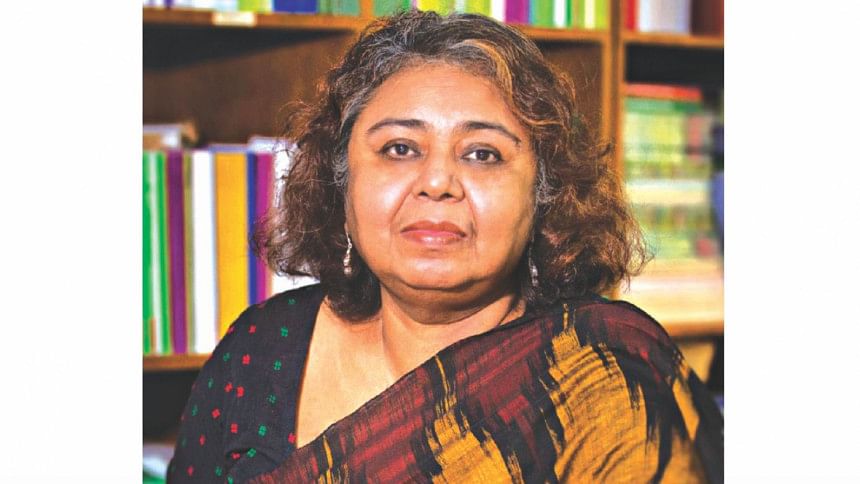Women's pledge to fight against all kinds of dominance

Professor Dr. Meghna Guhathakurta is executive director of Research Initiatives, Bangladesh. She taught international relations at the University of Dhaka for twenty-two years. She co-edited the book titled 'Bangladesh Reader: History, Culture, Politics', published in 2013 from Duke University Press. Psymhe Wadud from Law Desk talks to her on the following issues ahead of the International Women's Day on March 8.
Law Desk (LD): Last year was eventful. The enactment of the Child Marriage Act widened a new dimension of discourse on conceptualising the fate of the women (specially girl children) in Bangladesh. Please share your thoughts and observation on it.
Meghna Guhathakurta (MG): It has to be seen uncompromisingly. Development is becoming possible because of laws that restrain child marriage. Prohibition against child marriage should not be compromised. If it takes place then what consequences will follow and how that will be dealt with is a different thing. But the law itself cannot really appreciate child marriage to take place. There might remain discretionary power vested with the judges and judges may apply the same in a situation-specific way, but law should not make way for something like this. If there arises a situation for a girl child who doesn't have anyone to take care of or maintain her, in that case, the court might, upon analysing all the circumstances, give permission for marrying her off. When the draft rules say something about 'romantic relationship', it in fact paves way for legalising rapes. How can law define a romantic relationship remains a question. When the world is moving towards bringing even date-rape under law and considering the same as an offence, we are stepping backward. Modernism, to me, means to be more sensitive-towards the crimes and the wrongs done in the society. If law compromises with such a thing, it will definitely be a mistaken step.
LD: Has Bangladesh reached the point from where positive discrimination needs to be thought afresh from a different perspective?
MG: Bangladesh has not reached the point. Affirmative action is for a community, for a population who has been subjected to age-old discrimination. One woman might get a good amount of salary and another woman might not be a working woman, in fact. Affirmative action is for both of them. Affirmative actions basically are taken in order to make right a historical injustice and a persisting wrong. A woman might be in the same profession as that of her brother. But the sphere of getting the salary spent is a different thing. The brother can spend the money in a multifaceted way and in an extensive sphere whereas for the woman, the sphere is rather limited. That woman doesn't need quota because she is earning as much as her brother is not a tenable argument. What follows after getting the salary and how economic independence for a woman is still a myth is why we need quota for.
Equal pay is hardly there in the lower stratum of the society. I have worked with Munda community, Santal community women. They work similarly, in a similar way, putting the same level of effort and for same number of hours. But they do not get equal payment of wages. So you can see, women are working, they are being self-sufficient but the historical injustice and subjugation still prevails and that is where we need affirmative actions. As long as the term equality doesn't get the fullest form of itself socially and politically, quota needs to remain.
LD: In light of your extensive field works done in the Chittagong Hill Tracts (CHT), how do you see the human rights situation of the indigenous women?
MG: In CHT, there are numerous incidents of violence and only a few get reported. The settlers have become the next-door neighbors of the indigenous people due to the influx. The Bangalis who have been living there for a long time, has a kind of understanding with the natives. Now these new settlers don't have any understanding with the people. And these people often have conflicts with the natives regarding land grabbing and in terms of other interests. The nature of violence is systemic. It's within the structure and the system itself. It has become an inherent feature of society, community and politics. The regional institutions over there which are supposed to work, are not working properly because of the lack of participation of the indigenous people therein. Systemic discrimination paves the way for systemic violence. Nationally, the central institutions do not get much bothered about the violation in the outlying areas and the regional institutions do not do anything because they are also a party to the conflict. The accord is not getting implemented because the representation is not there. This is because of the policies that the state is taking. We can either term it as 'indifference' or as a consciously adopted policy. Those who are in the regional tier, are abusing this in their favour and worsening the situation.
LD: You are currently working in a project for the making of a National Action Plan (NAP) on women peace and security. Tell us about your experience in this project.
MG: From Bangladesh, a great number of women are participating in peace and security sectors. In NAP project, I want to know about the struggle of those women who are now holding a higher position in police and defence. I interviewed those women and came to know that they first had to convince their families for joining these services. One of the women said that she passed BCS at a time when women used to hardly get it. But she had her posting outside Dhaka. Her family formerly consented to her being a civil service cadre. But when the gazette was published, her father discouraged her seeing her posting place. She went to government offices and asked them for reconsidering it. A woman fights hard and gets the job ultimately but if she is posted somewhere so far from where her family resides, it becomes extremely difficult for her to take the job. Many women are getting educated. But in comparison thereto, the rate of working women is not increasing. The administration needs to be supportive towards the women who ultimately make their way to a job at least. Those who join armed forces, say that even though their family supports them, they face problems and face discrimination in their work place. Each generation passes through a different nature of crisis, a different nature of discrimination. The nature of struggle they have also changes with time. Depending on the kind of crises that you face, you need to search for the allies and finally set for a better future so that the next generation doesn't have to face the crisis that you have faced in your time. Mind-set cannot be changed overnight. It's a generational change and it's a process. It basically starts with the family. The family needs to be educated first.
LD: The theme for this year's women's day is 'Press for Progress'. How do you construe the idea of giving continuous efforts by the women for their progress? Leave a message to the women out there.
MG: I would definitely ask them to press for progress and also to press for privilege. Privilege doesn't mean dominance over the counterpart. The women are numerically the majority but they have been treated as the minority. The fear of patriarchy basically is that if women get the freedom they want, being the majority they can bring about wonderful changes and will have dominance over the men. Those who are privileged have to be made understood that they cannot thrive alone. Privilege has to be redefined. Dominance is everywhere in the society. Women need to fight against all kinds of dominance in order to become privileged, in a redefined way.
LD: Thank you.
MG: You are welcome.

 For all latest news, follow The Daily Star's Google News channel.
For all latest news, follow The Daily Star's Google News channel. 



Comments